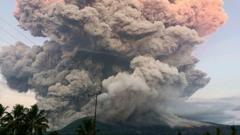As the situation develops, the atmospheric tension and the implications for regional stability remain significant.
**Escalation of Tensions: Trump Demands Iran's Surrender Amid Ongoing Conflict**

**Escalation of Tensions: Trump Demands Iran's Surrender Amid Ongoing Conflict**
Amidst escalating tensions in the Middle East, President Trump's social media declaration demanding Iran's "unconditional surrender" signals a potential shift in U.S. involvement. As Israel intensifies its military campaign against Iran, signs indicate that the U.S. may join the efforts, raising concerns about a broader conflict.
June 17, 2025, marks a pivotal moment as tensions between the United States, Israel, and Iran have reached an unparalleled level. President Trump asserted his call for Iran's "unconditional surrender," amidst claims of U.S. military backing to Israel in its ongoing airstrikes against Iranian targets. The statement was made as Trump returned from the G7 summit in Canada to address the escalating conflict in the Middle East.
Trump's alarming declarations have drawn attention to the possibility of deeper U.S. military involvement, resonating with Israeli Prime Minister Benjamin Netanyahu's requests for aggressive measures against Iran’s nuclear capabilities. Trump's social media posts echoed this sentiment as he hinted at U.S. control over Iranian airspace, stating, “we now have complete and total control of the skies over Iran,” while meanwhile, he threatened Iranian Supreme Leader Ayatollah Ali Khamenei, asserting, “we know exactly where he is hiding.”
In recent days, Israeli airstrikes have heavily targeted Iran's military and nuclear sites. Reports suggest the bombing campaign is aimed at crippling Iran's capacity to produce nuclear weapons, marking a significant escalation in the long-standing conflict between these nations. Israeli military officials declared that direct impacts were made on critical sites like Natanz, where Iran enriches uranium.
As military activities escalate, Iran appears to be reevaluating its missile launch strategy against Israel, leading to fewer missile attacks as the two nations navigate a precarious balance of power. This shift could imply impaired Iranian capabilities or a tactical regrouping in anticipation of a prolonged conflict.
The humanitarian toll from this conflict is mounting. As evacuations intensify in Tehran due to Israeli attacks, those within the capital face dire conditions exacerbated by internet limitations imposed by the government, ostensibly to restrict information flow. The Iranian public has grown restless, struggling with rising fatalities and ongoing military threats, leaving many in a state of panic and confusion.
This situation poses critical questions about future diplomatic resolutions. While Trump's approach leans towards military solutions, his earlier stance had emphasized negotiations, complicating the administration's long-term objectives in the region. Meanwhile, global leaders like French President Emmanuel Macron continue to stress the need for diplomatic dialogue rather than hostility to avoid potential chaos in Iran.
As the landscape of diplomacy and conflict continues to shift rapidly, the international community watches closely, aware that the ramifications of this conflict extend far beyond the immediate participants. The stakes have never been higher, and the path forward remains fraught with uncertainty.
Trump's alarming declarations have drawn attention to the possibility of deeper U.S. military involvement, resonating with Israeli Prime Minister Benjamin Netanyahu's requests for aggressive measures against Iran’s nuclear capabilities. Trump's social media posts echoed this sentiment as he hinted at U.S. control over Iranian airspace, stating, “we now have complete and total control of the skies over Iran,” while meanwhile, he threatened Iranian Supreme Leader Ayatollah Ali Khamenei, asserting, “we know exactly where he is hiding.”
In recent days, Israeli airstrikes have heavily targeted Iran's military and nuclear sites. Reports suggest the bombing campaign is aimed at crippling Iran's capacity to produce nuclear weapons, marking a significant escalation in the long-standing conflict between these nations. Israeli military officials declared that direct impacts were made on critical sites like Natanz, where Iran enriches uranium.
As military activities escalate, Iran appears to be reevaluating its missile launch strategy against Israel, leading to fewer missile attacks as the two nations navigate a precarious balance of power. This shift could imply impaired Iranian capabilities or a tactical regrouping in anticipation of a prolonged conflict.
The humanitarian toll from this conflict is mounting. As evacuations intensify in Tehran due to Israeli attacks, those within the capital face dire conditions exacerbated by internet limitations imposed by the government, ostensibly to restrict information flow. The Iranian public has grown restless, struggling with rising fatalities and ongoing military threats, leaving many in a state of panic and confusion.
This situation poses critical questions about future diplomatic resolutions. While Trump's approach leans towards military solutions, his earlier stance had emphasized negotiations, complicating the administration's long-term objectives in the region. Meanwhile, global leaders like French President Emmanuel Macron continue to stress the need for diplomatic dialogue rather than hostility to avoid potential chaos in Iran.
As the landscape of diplomacy and conflict continues to shift rapidly, the international community watches closely, aware that the ramifications of this conflict extend far beyond the immediate participants. The stakes have never been higher, and the path forward remains fraught with uncertainty.






















